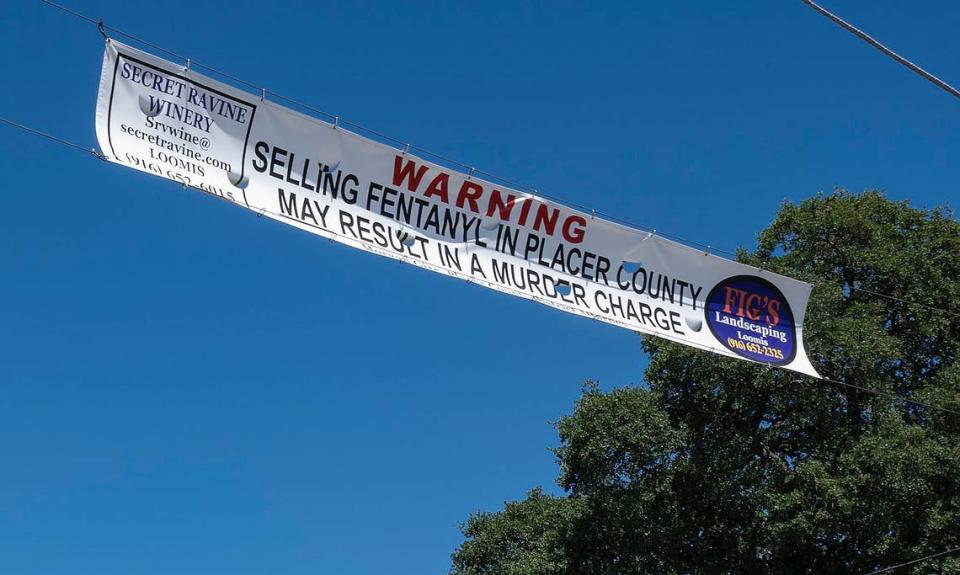After legal victory in fentanyl murder case, California DA emphasizes limits of new approach
Before he became Placer County’s district attorney in 2020, Morgan Gire developed a reputation as a skilled and judicious lawyer.
It came across when he paced in front of a jury, guided police officers through training courses and sifted through legislative bills and proposals.
So, it has been no surprise to supporters and former colleagues that Gire and his office are at the forefront of a unique approach playing out in courtrooms across California.
He and other district attorneys are pursuing murder charges against people who sell or provide drugs with lethal doses of fentanyl to someone who later dies from taking them. It’s a novel twist on an old legal strategy, and one that is being closely watched by law enforcement and lawyers across the state.
Earlier this month, the effort reached a major milestone in Placer County when a man pleaded guilty to second-degree murder following the death of a teenager. He is believed to be the first person in California to plead or be found guilty of the charge in connection to a death caused by fentanyl.
Yet Gire, in recent interviews, didn’t take a victory lap. While he acknowledged the recent plea affirmed the tactic could work, he also pointed to its limitations.
“If we were doing nothing else about fentanyl except just picking and choosing murder cases, I would say we’d be making very little difference.”
His office uses the approach “sparingly — as it should be used — and in the most egregious of circumstances,” he said. So far, it has done so three times, all of which occurred last year.
Still, the recent legal victory has major implications and comes as Gire and other district attorneys are frustrated by state legislators.
Lawmakers have stalled bills that have tried to punish dealers more strictly. In part, due to concerns they would send more people to prison, and for longer, but would not meaningfully reduce drug use and deaths. One recent bill would have required judges to read warning messages to people found guilty of selling or dispensing drugs containing fentanyl. It had strong bipartisan support, yet stalled.
McGregor Scott, the former U.S. Attorney for the Eastern District of California, called the recent legal tactic “well placed” given the circumstances.
“There’s a void there that Morgan, and some of the other DAs, are trying to fill.”
Roots of new approach
Gire, 49, was born and raised in Loomis, the small Placer County town about 20 miles northeast of Sacramento. His father worked as a computer programmer for the state and his mother was a freelance writer.
After finishing law school in Tennessee, Gire wanted to return closer to home. But the Placer County District Attorney’s Office wasn’t hiring at the time, he said. Riverside County’s office was. So, he went there in 1999.
Michael Hestrin said Gire developed a reputation there as a hardworking and no-nonsense prosecutor who was also witty and easy to get along with. The two have stayed friends since.
“He was very well thought of,” said Hestrin, who is currently the district attorney in Riverside County.
While there, Gire worked on an array of cases. Some included instances when people committed minor driving offenses, like falling asleep or taking a curve too fast, but ended up killing others. Choosing what charges to pursue, or not, wasn’t always clear-cut.
The gravity of such legal calculations left the young lawyer humbled.
“The decisions we make,” he said, “and the courses we choose to take in particular cases have such impact on human life.”
It is with that understanding that Gire said his office is pursuing murder charges. He recognizes that some may call it an “extreme approach,” but he counters that it is only “one necessary component to the overall fight.”
Like other parts of the state and country, Placer County has seen a rapid rise in fentanyl-related deaths. In 2021, the most recent annual data available, the county had at least 50 people die due to opioids although it is not clear how many were because of fentanyl. The drug killed more than 5,900 people across California that year.
As prosecutors in Placer County kept reviewing cases of people dying, Gire said evidence started to show that some dealers knew what they were selling could be deadly.
In California, people can be charged with murder if they know something is dangerous, do it anyway, and it results in someone’s death. A seminal case on the matter came in 1981. The California Supreme Court ruled a drunk driver, who killed two people, could be charged with murder because his actions showed a conscious disregard for the safety of others before the crash.
Gire and other prosecutors in the office felt murder charges were warranted in response to some fentanyl deaths. In February of 2022, the office filed its first.

The second was Nathaniel Cabacungan, 21, who recently pleaded guilty. Prosecutors accused him of causing the death of a 15-year-old girl when he was charged in August of 2022. The third murder charge came in October.
Gire declined to discuss Cabacungan’s case in detail because he has not yet been sentenced. The court file includes limited information and the Placer County Sheriff’s Office denied a records request for his arrest report.
Cabacungan declined to comment on his case through Brad Whatcott, his public defender.
Gregory Totten, who heads the California District Attorneys Association, did not know how many other counties have pending murder charges related to fentanyl deaths. But he believes the recent plea was the first second-degree murder conviction in the state for a death caused by the opioid.
Sacramento has not yet filed a murder charge, said District Attorney Thien Ho, but the office is collecting evidence in cases that could be used for future ones. Hestrin, from Riverside, said his office has filed around 30.
Even so, the legal strategy will likely get reviewed by a higher court in the future. Gire expressed confidence the cases his office has filed would be upheld if challenged.
“The law’s been around for a long time,” he said. “This is just a new application of facts.”
Placer County Public Defender Dan Koukol declined to discuss the approach of filing murder charges saying in an email that “legal matters should be argued in courtrooms, not the media. This helps to ensure that decisions are based on evidence and legal principles, not public sentiment.”
Frustrations with Sacramento
Gire knew he wanted to be a prosecutor after taking a class as an undergraduate at San Diego State University. It was taught by a federal prosecutor who walked students through the types of decisions one makes in the job. Gire absorbed every second of it.
When he talks about his work now words spill out of his mouth quickly.
“I love this stuff,” he said. “It’s the only job I ever wanted and it’s the only one I ever plan on doing.”
After several years in Riverside, he moved to the Sacramento County District Attorney’s Office to be closer to his now-wife. He stayed there for more than 15 years.
Anne Marie Schubert was the district attorney in Sacramento during the later part of Gire’s time there. She said he has “very sound judgment” and is “wicked smart, but not in an egotistical way.”
Gire worked on gang and sex crime prosecutions before later aiding Schubert on advocacy and policy matters. That meant following what was going on at the state Legislature, which is something Gire continues to do.
In December, he urged lawmakers to take “meaningful legislative action” to try to prevent fentanyl deaths. So far, Gire said he has come away feeling disappointed and that legislators aren’t doing enough to increase the tools prosecutors have to more strictly punish dealers.
One of the proposals he supported is Senate Bill 44, which would have required judges to warn people that are guilty of selling or handing out drugs about the dangers of fentanyl. If a person continues to distribute drugs, and someone dies from fentanyl because of it, the cautionary message could be used as evidence in a future murder case.
State law requires that people convicted of driving under the influence of alcohol be advised about the dangers of doing so. If they continue to, and kill someone as a result, they could be charged with murder, according to the warning.
Fentanyl admonishments are already happening in some courtrooms. Along with Placer, defendants in at least Sacramento, El Dorado, Riverside and Yolo counties are receiving them, according to interviews and information put out by those offices. But the bill would have provided standard language and required its use across the state.
At least half of all state Senators supported SB 44. Yet it failed on multiple attempts to get through a committee that reviews public safety-related bills. Democratic members, in their opposition, cited concerns it would have unintended consequences and was not proven to limit overdose deaths. Efforts to pass similar proposals have also failed in recent years.
Sen. Tom Umberg, D-Santa Ana, introduced the bill with a Republican colleague. The former federal prosecutor agreed with critics of the Legislature.
“We need to do more,” he said.
Umberg plans to reintroduce the proposal in some way as well as push forward other fentanyl-related measures.
Vowing, “I’m not done.”
Getting the word out
Bonnie Gore was on the Placer County Board of Supervisors in 2020 when she and other members interviewed district attorney candidates after the previous leader retired.
Gire, she said, stood out. He wanted to take issues on directly and was also thoughtful and reasonable. He talked about wanting to both prosecute and educate.
“I think we’re seeing this play out now,” Gore said.
Gire and other representatives in the office have spoken to community groups, students and parents about the dangers of fentanyl.
“That’s how we’re going to solve the problem,” he said. “I’m not going to solve the fentanyl crisis in Placer County by prosecuting everybody with murder.”
One of his presentations came during a parent information night at the high school attended by Zach Didier. In December 2020, the 17-year-old died after he took a pill he thought was a Percocet, but actually contained a lethal dose of fentanyl. Last year, a man who sold Didier the pill was sentenced to 17 years in prison.
Laura Didier, Zach’s mother, said she appreciates how Gire makes himself available to speak when she is doing community events.
“He’s always made it very clear that the awareness and education part of it is incredibly important as well,” she said.
Gire appears to have widespread support. In June of 2022, he was elected to serve his first full term as district attorney after running unopposed.
Earlier this month, the Loomis Lions Club had a 23-foot by 3-foot banner put up over a major road in the town, home to about 6,800 people. It carries a warning: selling fentanyl in the county may result in a murder charge. Gire’s name is written below the message.
The idea came out of a town hall meeting on fentanyl earlier in the year that Gire and others spoke at, said Jack Morris, a Lions member who helped organize the display.
“We treat him like a God in the club,” Morris said. “We feel that sign was a show of support for Morgan Gire.”


